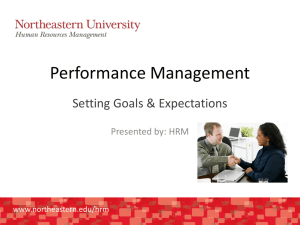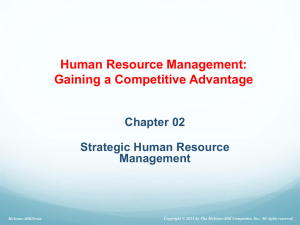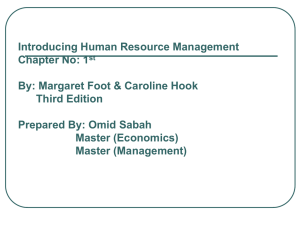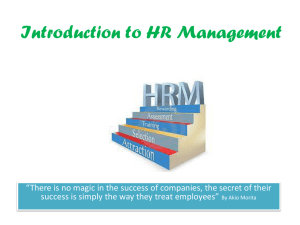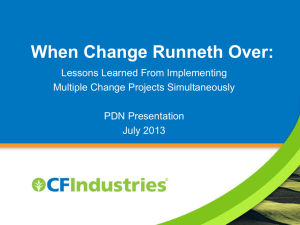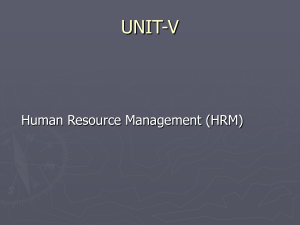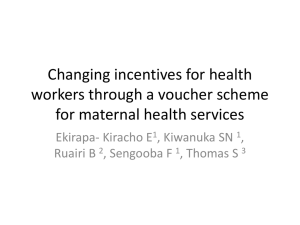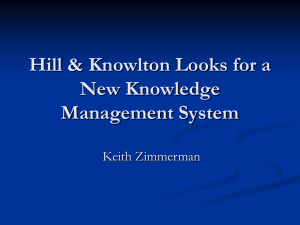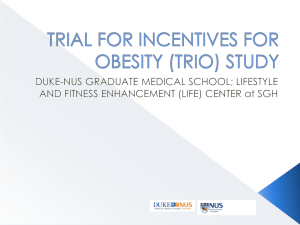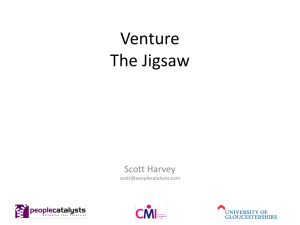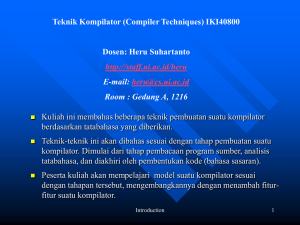Bedah-buku
advertisement
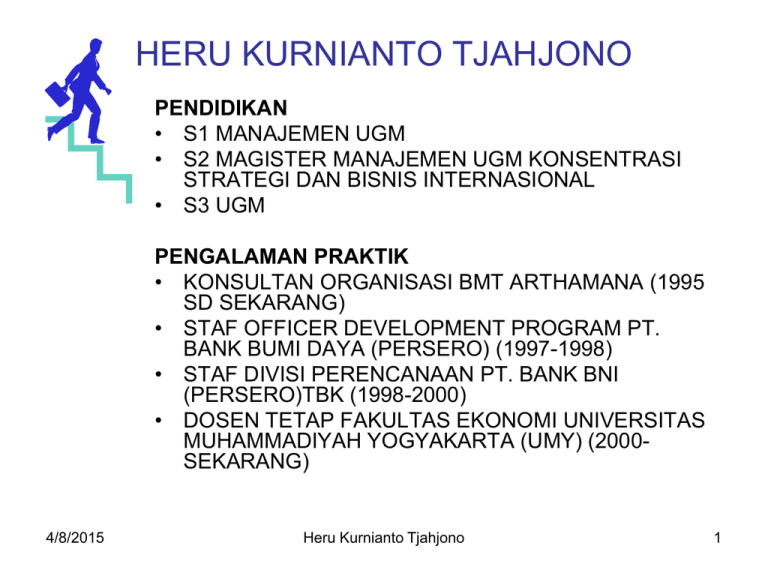
HERU KURNIANTO TJAHJONO PENDIDIKAN • S1 MANAJEMEN UGM • S2 MAGISTER MANAJEMEN UGM KONSENTRASI STRATEGI DAN BISNIS INTERNASIONAL • S3 UGM PENGALAMAN PRAKTIK • KONSULTAN ORGANISASI BMT ARTHAMANA (1995 SD SEKARANG) • STAF OFFICER DEVELOPMENT PROGRAM PT. BANK BUMI DAYA (PERSERO) (1997-1998) • STAF DIVISI PERENCANAAN PT. BANK BNI (PERSERO)TBK (1998-2000) • DOSEN TETAP FAKULTAS EKONOMI UNIVERSITAS MUHAMMADIYAH YOGYAKARTA (UMY) (2000SEKARANG) 4/8/2015 Heru Kurnianto Tjahjono 1 KETERKAITAN MANAJEMEN STRATEGIS DAN MSDM Administrative Linkage Strategic planning HRM function 4/8/2015 One-way Linkage Two-way Linkage Strategic planning Strategic planning HRM function HRM function Heru Kurnianto Tjahjono Integrative Linkage Strategic planning HRM function 2 McKinsey 7’s Model Organizational Effectiveness Politics Demographic Strategy Economic Structure System Regulation Shared values Technology Staff Social Skill Style Globalization Government Bureaucracy Human Right Strategy implementation Strategy formulation External analysis Opportunities Threats Mission Mission Goals Strategic choice External analysis Strengths Weaknesses 4/8/2015 HR practices HRM PLANNING JOB DESIGN JOB ANALYSES REKRUITMENT SELECTION AND PLACEMENT ORIENTATION TRAINING AND DEV’T PERFORMANCE APPRAISAL COMPENSATION MANAGING HEALTH AND SAFETY EMPLOYEE RELATIONS HUMAN RESOURCES INF SYSTEM, ETC HR needs Skills Behaviors Culture HR capability Skills Abilities Knowledge Heru Kurnianto Tjahjono Emergent strategies HR actions Behaviors Results (Productivity, absenteeism, turnover) Firm performance Productivity Quality Profitability Strategy evaluation 4 STRATEGIC CHOICE AND STRATEGIC APPROACH TO HUMAN RESOURCES MANAGEMENT • STRATEGIES FOR HUMAN RESOURCE ACQUISITION AND PLACEMENT (Recruitment, Selection & Placement) • STRATEGIES FOR MAXIMAZING HUMAN RESOURCES PRODUCTIVITY (Orientasi, Training-dev’t, Performance appraisal, Kompensasi) • STRATEGIES FOR MAINTAINING HUMAN RESOURCES (Benefit plans, Managing health, safety-stress) • STRATEGIC SEPARATION (Restrukturisasi) Menu Human Resource Management Job Analysis and Design Few tasks Simple tasks Few skills required Specific job descriptions Many tasks Complex tasks Many skills required General job descriptions Recruitment and Selection External sources Limited socialization Assessment of specific skills Narrow career paths Internal sources Extensive socialization Assessment of general skills Broad career paths Training and Development Focus on current job skills Individual orientation Train few employees Spontaneous, unplanned Focus on future job skills Group orientation Train all employees Planned, systematic Performance Management Behavioral criteria Developmental orientation Short-term criteria Individual orientation Results criteria Administrative orientation Long-term criteria Group orientation Pay Structure, Incentives, and Benefits Pay weighted toward salary & benefits Short-term incentives Emphasis on internal equity Individual incentives Pay weighted toward incentives Long-term incentives Emphasis on external equity Group incentives Labor and Employee Relations 4/8/2015 Collective bargaining Top-down decision making Formal due process Few employees as expense Individual bargaining Participation in decision making No due process Few employees as assets HOW COMPANIES CAN INCREASE ORGANIZATIONAL CAPABILITIES • FORMULATE CORPORATE STRATEGY • FORMULATE COMPLEMENTARY HUMAN RESOURCES STRATEGIES • ALIGNMENTCOMPLEMENTARY THE VISION STRATEGIES AND VALUES • ASSESS LEARNING NEEDS • PROVIDE LEARNING OPPORTUNITIES • ASSESS LEARNING RESULTS • PROVIDE MORE LEARNING OPPORTUNITIES • MODEL DESIRED BEHAVIORS • REWARD DESIRED BEHAVIORS • CONSTANTLY REINFORCE BEHAVIORAL CHANGE

